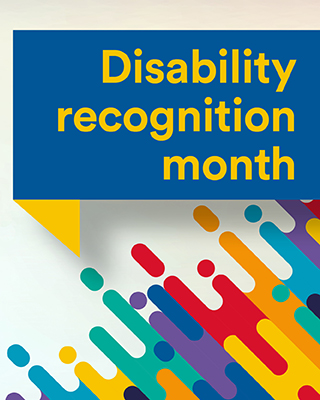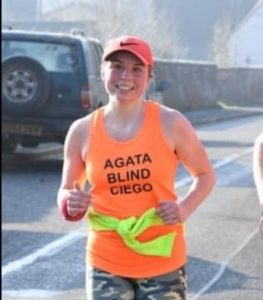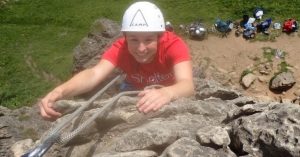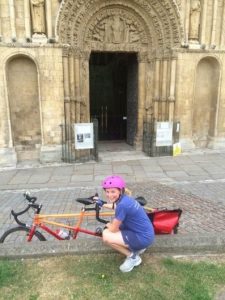
May 19, 2021, by Guest Blogger
Disability Recognition Month Alumni Blog Series: Agata Cienciala
This month, we’re delighted to share a series of blogs from alumni reflecting on this year’s theme of ‘Disability: Finding our way’.
Our alumni have been kind enough to share their experiences of living with a disability whilst studying at Nottingham, how they found transitioning to and from university life and their career journeys to-date, along with their advice to inspire and support for current students and staff.
This week, we’re delighted to introduce alumna, Agata Cienciala, who graduated from Nottingham in 2018 with a degree in History.

In this blog, Agata shares her experiences of studying at the university as a visually impaired student and how her time at Nottingham was shaped by her involvement with sport.
Students and staff alike will benefit from learning about Agata’s story – whether they have a similar disability themselves or are supporting those who’s university experience is a little less straightforward than most. We’d like to thank Agata once again for sharing so openly and honestly.
“My name is Agata and I studied history at Nottingham between 2015 and 2018. I’m blind and have been since I was 14. I use a screen reader to access the computer which means that text is converted to speech.
“It feels strange to say that I ‘chose’ to study at Nottingham, because it wasn’t my first choice, but after I had made the decision to accept my place and started hearing about all the amazing sports opportunities that there were available for disabled students, not to mention that my course did look great, I was excited to have ended up at the university.
“The first term at uni was hard. Having taken a gap year, most of my friends from school had already started their uni experiences and I interpreted the amazing time they were having as pressure for me to do the same. It took me a while to realise how I would like to shape my time at uni. Sport, it became increasingly clear, would play a huge part in that.
“I arrived on campus a week before most students and met Hannah Webber during that week. From then on it became clear that the easiest way for me to get involved in uni life was to join all the disability sport related activities that were available.
“Being a blind student isn’t easy, despite all the support which is available. I got lost, a lot, on campus, particularly in the first term, but also over my three years at uni. I learnt what a panic attack was – finally linking my breathlessness when I became stressed or frustrated at a situation to a mental health trigger. But I could generally find a place of safety and security in the sports facilities and I did everything that was available. I swam, climbed, cycled, took part in horse riding, kayaked, did a session of scuba diving. I also began to run on campus because Hannah introduced me to the idea of guide running. I took part in supported fitness sessions and developed a love of lifting heavy weights and yoga. I had never had the opportunity to try so much sport in a low pressure, relatively easily accessible environment. I couldn’t believe my luck.”
My journey since graduating
“I left Nottingham three years ago – first for a job in Bradford and then back home to London to do a masters in history and to train as a sports massage therapist. The pandemic has currently put my massage career on hold, but I’ve started another job at a local council.
“I’ve been able to carry on a lot of the sports I first found at uni – running is a huge part of my life, and I climb, swim, cycle, lift, when I can. The biggest difference is the increased difficulty in getting to activities now that they’re not all an ‘easy’ walk away on campus.
“The extra travel and lack of education about how to do disability sport well beyond the university setting has meant it’s been harder for me to enjoy the activities I love. That being said, the grounding I had in accessible sport whilst at university has given me a great understanding of what inclusion in a sports setting can look like, so I’m able to be an advocate for myself and others. I speak on diversity and inclusion issues in my running club, for example.
“As for the world of work I will mention briefly that, as much as I love study, and as much as I have enjoyed my masters, the workplace is also pretty rewarding. I found studying so absorbing, and didn’t want to leave it behind, for the fear that my mind would rot, and I would lose all the ‘mental fitness’ I had gained. Work is not the same, but it leaves you more financially viable and introduces you to a great bunch of colleagues.”
My words of wisdom
“Students: figure out how you can make the most of your time at uni. If that’s loving your academic work, dig in. If that’s spending too much time in the gym, on the pitch, or climbing, do it. It’s likely you’ll never have so much time to invest in yourself or your interests again. So make the most of it.
“But also, try to balance that with looking after yourself, as well you can. And know that if your uni experience isn’t what you hoped it would be, or isn’t the same as those you see around you, that’s ok as well. There’s so much life beyond campus.”
Useful resources
- Whilst at university, Agata also featured in a video for UoN Sport talking about accessing the David Ross Sports Village as a visually impaired student which is available here.
- Further information about inclusive sport at Nottingham can be found online here.
- Information about the university’s Disability Support Services Team, our specialist service providing student-led support to enable disabled students to flourish as independent learners, is available here.
Many thanks to Agata for sharing her story. If you or someone you know would like to write a piece for the series, please email: Emily.Bateman@nottingham.ac.uk
No comments yet, fill out a comment to be the first

Leave a Reply